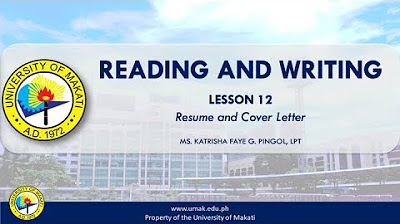LESSON 8: PURPOSEFUL WRITING IN THE DISCIPLINES AND FOR PROFESSIONS
Summary
TLDRThis lesson focuses on the essential elements of writing an effective resume. It covers the key components to include, such as contact details, an opening statement, skills, education, employment history, and references. The lesson also emphasizes the importance of professionalism in your resume and what not to include, such as personal information, errors, and unnecessary formatting. By the end of the session, students will understand how to craft a resume that demonstrates their qualifications and stands out to potential employers.
Takeaways
- 😀 A resume is a marketing tool that highlights your qualifications, experience, and skills to convince an employer you're the right candidate.
- 😀 The key components of a resume include contact details, an opening statement, key skills, software skills, personal attributes, education history, employment history, references, and testimonials.
- 😀 An opening statement should summarize who you are, your background, and what you bring to the job, written in first person without personal references.
- 😀 List 10-15 relevant skills on your resume that tie your experience to the job you're applying for, including work, studies, or volunteering.
- 😀 Technical or software skills should be included to demonstrate your proficiency in tools or technologies relevant to the job.
- 😀 If lacking work experience, personal attributes such as reliability, honesty, and quick learning can help showcase your suitability for the role.
- 😀 Educational history should include your highest level of education, along with any academic achievements like awards or leadership roles.
- 😀 Employment history should list jobs in reverse chronological order, highlighting achievements and significant contributions for each role.
- 😀 References should be provided, ideally from previous employers or colleagues who can positively recommend you. Include their position and contact details.
- 😀 A testimonial from a colleague, teacher, or employer can further validate your skills and experiences, boosting your resume.
- 😀 Avoid including personal information like birthdate, gender, or health details, and ensure your resume is free of spelling errors, images, fancy formatting, and unnecessary tables.
Q & A
What is the primary focus of this lesson?
-The primary focus of this lesson is on business writing, specifically on how to write an effective resume.
Why is a resume considered an essential document for job applications?
-A resume is essential because it provides employers with a summary of your qualifications, skills, experience, and achievements, helping them assess if you're suitable for the role and worthy of an interview.
What are the key qualities a resume should demonstrate?
-A resume should demonstrate that you are employable, meet the job and organization's requirements, possess the right qualifications, and have the experience and skills necessary for the job.
What basic information should be included at the beginning of a resume?
-The resume should include your contact details (name, email address, and phone number), ensuring they are up to date and accessible.
What is an opening statement in a resume, and what should it contain?
-An opening statement is a brief summary of who you are, your educational background, work experience, and what you bring to the job. It should be concise, around six lines long, and written in the first person without personal references.
How many skills should be listed in a resume, and what type of skills should be included?
-Your resume should include 10 to 15 key skills that link your experience to the job you're applying for. These could include skills gained from work experience, studies, placements, or volunteer work.
What role do technical or software skills play in a resume?
-Technical or software skills are important to list on your resume to demonstrate your proficiency in using relevant tools and software, such as word processors, spreadsheets, or programming languages.
What should be included in the employment history section of a resume?
-The employment history section should start with your most recent job and work backward, providing job titles, employment dates, and a list of significant achievements or contributions for each role.
What types of references should be included in a resume?
-Your resume should include three references, ideally people you've worked with before, who can positively recommend you as an employee. These references should include their name, position title, and contact details.
What common mistakes should be avoided when preparing a resume?
-Common mistakes to avoid include including unnecessary personal information (like birth date or gender), using poor formatting, submitting resumes with typos, and submitting in the wrong file format, such as PDFs unless specifically requested.
Outlines

This section is available to paid users only. Please upgrade to access this part.
Upgrade NowMindmap

This section is available to paid users only. Please upgrade to access this part.
Upgrade NowKeywords

This section is available to paid users only. Please upgrade to access this part.
Upgrade NowHighlights

This section is available to paid users only. Please upgrade to access this part.
Upgrade NowTranscripts

This section is available to paid users only. Please upgrade to access this part.
Upgrade Now5.0 / 5 (0 votes)





